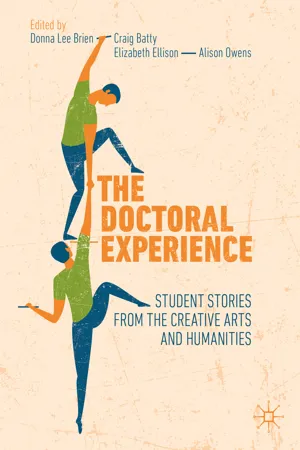The doctorate represents the most advanced form of adult education and qualification . Although considerable effort, research and training has been expended on the process of completing a doctorate , there has been far less interest or focus on the lived experience of doing one—the human, and often relatively veiled dimension that underpins the highest level of formal learning achievable. With this is mind , this book offers a wide variety of personal insights from creative arts and humanities research students into the challenging yet rewarding journey of undertaking a doctorate . Recognising that the doctoral journey is simultaneously cognitive , emotional , spiritual, ethical and transformational , the book presents a range of chapters written by current or very recently completed doctoral students (as well as one intending candidate ) that capture the essence of what it means to undertake a doctorate in the twenty first century. Unlike other books that focus on the degree milestones that completing doctoral level study entails, this book is uniquely organised around the themes and concerns that students themselves have identified as centrally important to successfully completing their research degrees —the invisible work of the doctorate . From assessing the self to working with others, from building resilience to developing networks, and considering how ethical conduct permeates a researcher’s practice , this book takes its readers—both students and supervisors —on a journey towards successful doctoral learning . Each section is framed by ideas and concepts suggested by the editors, who are experienced doctoral supervisors , but the core content of the book is purposely student-driven and authored. This, we hope, will provide an authentic and user-friendly account of the doctoral experience .
On Doctoral Learning
In the students’ accounts of their experiences and journeys , it is not surprising to see them demonstrating sophisticated levels of conceptual, procedural, declarative and metacognitive knowledge , as defined in Benjamin Bloom’s Taxonomy (Anderson and Krathwohl 2001). Constructivist accounts of adult learning emphasise the sequential and developmental process of assimilating new knowledge with existing knowledge , and then applying this newly assimilated knowledge to practice . In his model of the Experiential Learning Cycle , David Kolb (1981) emphasises the cyclical process of theorising abstract conceptualisations, testing these theories through application to concrete experiences , and then reflecting on outcomes to generate further and more refined theorisations. This cyclical process applies very clearly to doctoral study, which aims to develop new knowledge (and/or theories) supported by evidence drawn from real-world investigations through research, and implying further research through a process of reflective analysis, evaluation and further theorisation. As the students in this book discuss, the challenges and complexities of undertaking a doctorate have been embraced and overcome to produce resilient learners who are not only able to complete research projects , but who are also able to understand the journey they have undergone and fold it back into their ongoing practice —as researchers, practitioners , teachers , and so on.
Other constructivist models of learning organise the development of cognitive complexity as a hierarchical process , for example, Bloom’s Taxonomy (Anderson and Krathwohl 2001), John Biggs’ SOLO (Structure of Observed Learning Outcomes) (Biggs and Tang 2011), and Matthew Perry’s ‘nine positions’. Perry’s model (1975) progresses from a dualistic—right or wrong—approach, to acquiring knowledge through a multiplistic understanding of knowledge as context -dependent and uncertain, to a sophisticated response to relative values and contingent knowledge through a process of commitment to a reasoned position. The doctoral journey represents an engagement with knowledge and reality that is necessarily performed at the higher end of the hierarchy of cognitive complexity . Doctoral students ‘theorise the unknown’, performing what Biggs (Biggs and Tang 2011) has defined as ‘extended abstract’ thinking in a sustained and structured process , engaging with the higher order cognitive processes of evaluative and creative thinking (Anderson and Krathwohl 2001). With many of the doctoral projects described in this book drawn from students of the creative arts , creative thinking is particularly evident. In this context , each chapter provides an evaluative account of an aspect of doctoral study that has challenged the student-author , whose reflective assessment and subsequent ‘breakthrough’ can help inform and support others undertaking their own research journeys.
This book thus celebrates the lived experience of undertaking a doctorate —the human dimension of high-level learning—and taps into some of the common personal challenges that students face and, ideally, learn how to overcome. Chapter authors are each at different stages of their doctoral journey (with some just completed), and their stories reflect on key aspects of the journey that had such an effect as to ‘stop them in their tracks’ and e...
